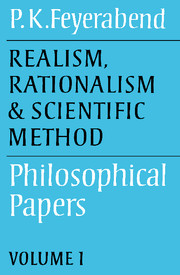Book contents
- Frontmatter
- Contents
- Introduction to volumes 1 and 2
- PART I ON THE INTERPRETATION OF SCIENTIFIC THEORIES
- 1 Introduction: scientific realism and philosophical realism
- 2 An attempt at a realistic interpretation of experience
- 3 On the interpretation of scientific theories
- 4 Explanation, reduction and empiricism
- 5 On the ‘meaning’ of scientific terms
- 6 Reply to criticism
- 7 Science without experience
- PART 2 APPLICATIONS AND CRITICISMS
- Sources
- Name index
- Subject index
7 - Science without experience
Published online by Cambridge University Press: 05 June 2012
- Frontmatter
- Contents
- Introduction to volumes 1 and 2
- PART I ON THE INTERPRETATION OF SCIENTIFIC THEORIES
- 1 Introduction: scientific realism and philosophical realism
- 2 An attempt at a realistic interpretation of experience
- 3 On the interpretation of scientific theories
- 4 Explanation, reduction and empiricism
- 5 On the ‘meaning’ of scientific terms
- 6 Reply to criticism
- 7 Science without experience
- PART 2 APPLICATIONS AND CRITICISMS
- Sources
- Name index
- Subject index
Summary
One of the most important properties of modern science, at least according to some of its admirers, is its universality: any question can be attacked in a scientific way, leading either to an unambiguous answer or else to an explanation of why an answer cannot be had. In the present note I shall ask whether the empirical hypothesis is correct, i.e. whether experience can be regarded as a true source and foundation (testing ground) of knowledge.
Asking this question and expecting a scientific answer assumes that a science without experience is a possibility; i.e., it assumes that the idea is neither absurd nor self-contradictory. It must be possible to imagine a natural science without sensory elements, and it should perhaps also be possible to indicate how such a science is going to work.
Experience is said to enter science at three points: testing; assimilation of the results of test; understanding of theories.
A test may involve complex machinery and highly abstract auxiliary assumptions. But its final outcome has to be recognized by a human observer who looks at some piece of apparatus and notices some observable change. Communicating the results of a test also involves the senses: we hear what somebody says to us; we read what somebody has written down. Finally, the abstract principles of a theory are just strings of signs, without relation to the external world, unless we know how to connect them with experiment, and that means, according to the first item on the list, with experience, involving simple and readily identifiable sensations.
- Type
- Chapter
- Information
- Realism, Rationalism and Scientific MethodPhilosophical Papers, pp. 132 - 136Publisher: Cambridge University PressPrint publication year: 1981



